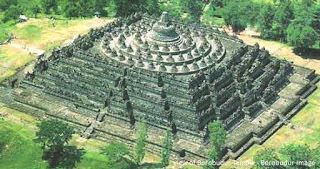When we look at the big agenda of the United Nations, the Sustainable Development Goals (SDGs), we will find that in some objectives, tourism sector becomes one of the significant targets. It is revealed several times, mainly in the eighth and twelfth goals. It means tourism sector plays a critical role in the effort of achieving sustainable development. This article attempts to picture various aspects in tourism sector that can be improved to enhance national economy in pursuing sustainable development.
We will begin with these questions: Who doesn’t want to travel around the world? Who doesn’t have the desire to visit beautiful places, such as mountains, beaches, lakes, etc? Who doesn’t like to taste various food from different areas? Normally, everybody loves to observe fascinating landscapes, experience variety of food, and even take a ‘selfie’ while enjoying them.
Individuals, families, and groups create an agenda for vacation, grasp some money from their wallets, buy tickets and reserve a hotel room, go traveling to enjoy exhilarating panoramas, release stress, and get themselves rejuvenated.
Consequently, the capital flows from one region to other, within a nation as well as among nations. That’s what makes tourism sector turn into a significant factor in economic development.
When we talk about tourism, not only we can view the physical sites, but we can also learn the value of local wisdom, the myth and legend, the traditional culture, and other fascinating aspects, such as food, language, and so forth.
Meanwhile, here are some examples of the multi scopes of tourism sector: when you visit Borobudur temple in Central Java, Indonesia; not only you will see the unique and extraordinary of the physical structure built in era of Sailendra dynasty that ruled upon Mataram kingdom during 760 – 830 CE, but you will also realize how intellectual the natives who created that construction by symmetrically arranging hundreds of stones. Furthermore, you can learn the traditional culture of ancient Java as well as the local wisdom it possessed.
Other examples are Raja Ampat in West Papua that offers beautiful marine sights, and Mount Rinjani in West Nusa Tenggara that entices you to the deeper dimension of life; both are in Indonesia. You will be amazed by the magnificent views, filled with positive energy, and loaded with spiritual impressions within your soul.
You may say it’s a promotion; however, the important point is that tourism sector can leverages other economic as well as non-economic aspects; hence, it can be benefited to amplify national economy and foster sustainable development.
Thus, there are some inputs to improve tourism sector in order to maximize the benefits and increase national economy:
ARTIKEL TERKAIT :
The Role of Traditional Dance: Promoting Tourism, Supporting the Economy
What Innovation Brings to the Economy
Understanding The Concept of Creative Economy
How Cultural Arts Encourage the Economy
We will begin with these questions: Who doesn’t want to travel around the world? Who doesn’t have the desire to visit beautiful places, such as mountains, beaches, lakes, etc? Who doesn’t like to taste various food from different areas? Normally, everybody loves to observe fascinating landscapes, experience variety of food, and even take a ‘selfie’ while enjoying them.
Individuals, families, and groups create an agenda for vacation, grasp some money from their wallets, buy tickets and reserve a hotel room, go traveling to enjoy exhilarating panoramas, release stress, and get themselves rejuvenated.
Consequently, the capital flows from one region to other, within a nation as well as among nations. That’s what makes tourism sector turn into a significant factor in economic development.
When we talk about tourism, not only we can view the physical sites, but we can also learn the value of local wisdom, the myth and legend, the traditional culture, and other fascinating aspects, such as food, language, and so forth.
Meanwhile, here are some examples of the multi scopes of tourism sector: when you visit Borobudur temple in Central Java, Indonesia; not only you will see the unique and extraordinary of the physical structure built in era of Sailendra dynasty that ruled upon Mataram kingdom during 760 – 830 CE, but you will also realize how intellectual the natives who created that construction by symmetrically arranging hundreds of stones. Furthermore, you can learn the traditional culture of ancient Java as well as the local wisdom it possessed.
Other examples are Raja Ampat in West Papua that offers beautiful marine sights, and Mount Rinjani in West Nusa Tenggara that entices you to the deeper dimension of life; both are in Indonesia. You will be amazed by the magnificent views, filled with positive energy, and loaded with spiritual impressions within your soul.
You may say it’s a promotion; however, the important point is that tourism sector can leverages other economic as well as non-economic aspects; hence, it can be benefited to amplify national economy and foster sustainable development.
Thus, there are some inputs to improve tourism sector in order to maximize the benefits and increase national economy:
- by developing high-quality and secured infrastructures, including roads, transportation, hotels/home stays, and supporting elements to attract visitors.
- by providing proper public facilities, such as health center, tourism center, and public toilets around tourism sites, as near as possible.
- by providing professional guides and guidance books/manuals to assist visitors, especially foreign visitors, and provide useful information about tourism spots.
- by promoting tourism sites to attract more visitors, through internet, exhibitions, and other media.
- by promoting local tradition, local food, handicrafts, cultural arts, and other local products with affordable costs, in order to offer more impression to the visitors.
ARTIKEL TERKAIT :
The Role of Traditional Dance: Promoting Tourism, Supporting the Economy
What Innovation Brings to the Economy
Understanding The Concept of Creative Economy
How Cultural Arts Encourage the Economy

Tidak ada komentar:
Posting Komentar